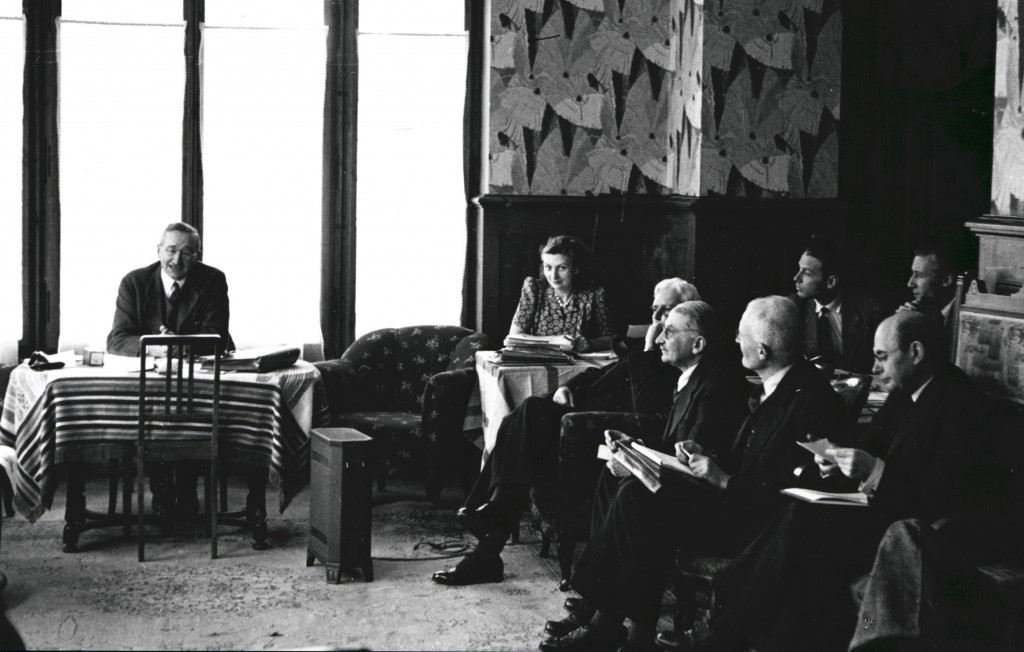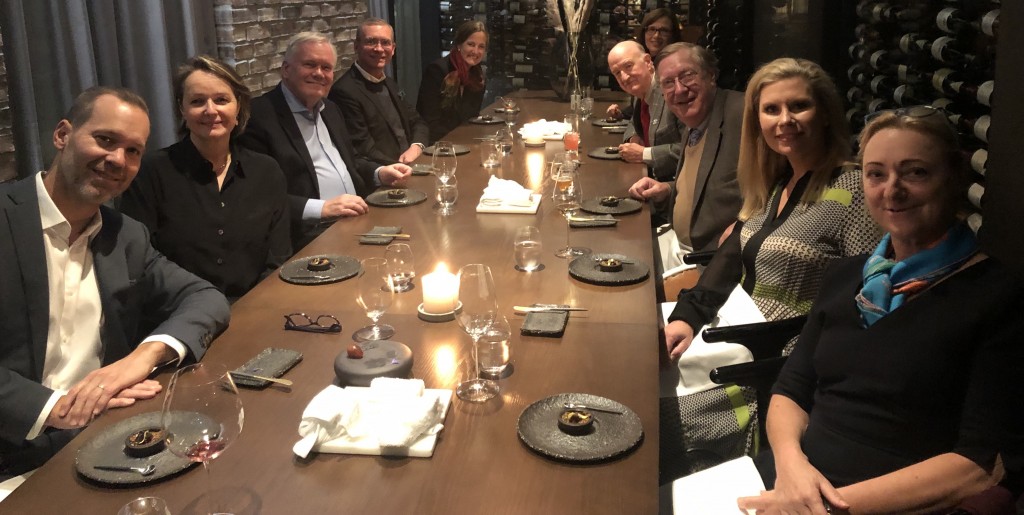
Gissurarson with two successful liberal reformers, Carlos Cáceres from Chile and Ruth Richardson from New Zealand, at the closing dinner on 8 October.
According to Freedom House and other independent observers, liberty is decreasing in the world, while authoritarianism is on the rise. This was one of the main topics, and worries, at the general meeting in Oslo 4–8 October 2022 of the Mont Pelerin Society, the (classical) liberal international debating club. In one of the sessions, Dr. Tom Palmer of the Atlas Network and Dr. Nils Karlson of Ratio Institute analysed populism as a threat to liberty. According to them, conservative parties in the West were turning increasingly populist. In the following discussion, RNH Academic Director, Professor Hannes H. Gissurarson, pointed out that the reconstruction of Italy, Austria, and Germany after the Second World War had been implemented by conservative-liberal alliances, led by statesmen like Luigi Einaudi and Alcide de Gasperi in Italy, Reinhard Kamitz in Austria, and Ludwig Erhard and Konrad Adenauer in Germany. Einaudi, Kamitz and Erhard were all members of the Mont Pelerin Society. Again, the wide-ranging liberal reforms in many countries in the 1980s and 1990s were implemented by conservative-liberal alliances, led by Margaret Thatcher in the United Kingdom and Ronald Reagan in the United States. Other pioneers were Mart Laar in Estonia, David Oddsson in Iceland, and Vaclav Klaus in the Czech Republic, as well as three former finance ministers who all happened to be present at the Oslo meeting, Leszek Balcerowicz of Poland, Carlos Cáceres of Chile, and Ruth Richardson of New Zealand. The question was, Gissurarson said, how to maintain this conservative-liberal alliance and convince conservatives of the merits of the free market.

The first MPS meeting in 1947. Hayek speaking and Dorothy Hahn taking notes. In front row from left: William Rappard, Ludwig von Mises, Walter Eucken and Carl Iversen. In second row from left: Herbert Cornuelle and Bertrand de Jouvenel.
At one of the sessions in Oslo, Professor Bruce Caldwell presented his recent book, based on original documents about the first conference of the Mont Pelerin Society in April 1947, more than 75 years ago. The Society was founded by Friedrich von Hayek, Milton Friedman, Wilhelm Röpke, Karl Popper, Bertrand de Jouvenel and other prominent classical liberals (not in the present American sense of the word) and named after its first meeting place in the Swiss Alps. Some of the papers read at the first conference are still available, and Hayek’s secretary, Dorothy Hahn, also took notes. Caldwell’s forthcoming biography of Hayek, based on decades of research, is eagerly awaited. At another session in Oslo, the future of liberalism was discussed. Some speakers wanted to be more receptive than most MPS members of the past to demands for free education and free health care and also for diversity, making liberalism more inclusive, they say, not solely focusing on economic freedom and efficiency. In particular, the example of German liberal Ralf Dahrendorf was invoked. Again, Professor Gissurarson intervened and criticised Dahrendorf’s idea of the equalisation of life chances. This amounted to the creation of positive rights or claims on productive people who were supposed to contribute to the costs of such equalisation. Liberals should instead continue to speak for consumers and taxpayers, innovators, entrepreneurs and investors, Gissurarson said. He reminded the audience of the eleventh commandment, as Milton Friedman called it: ‘Thou shalt not do good at other people’s expense.’ There was no right, Gissurarson submitted, to education paid for by others, although it was certainly prudent and indeed advisable to ensure that all citizens had a certain level of education. He also recalled that in the 1960s Dahrendorf, a member of the German Free Democrats, had followed his party in leaving the coalition with the Christian Democrats and forming instead a government with the Social Democrats, a government with a much less liberal economic agenda. Thus, the very successful conservative-liberal alliance in Germany was broken up.
From Iceland, Associate Professor Birgir Thor Runolfsson from the Economics Faculty of the University of Iceland also attended the conference which was ably organised by Lars Peder Nordbakken of the Norwegian Civita organisation. Speakers included Nobel Laureate Finn Kydland, economic analyst Anders Aslund and economic historian Deirdre McCloskey. In general, pessimism about the near future was prevalent at the conference, although Tom Palmer warned that pessimism could become a self-fulfilling prophecy. Nordbakken gave a talk about prominent Norwegian economist Trygve Hoff, a founding member of the Mont Pelerin Society, and Dr. Eamonn Butler spoke briefly, but movingly, about English liberal champion Linda Whetstone, who passed away unexpectedly in December 2021 after only serving a year as President of the Society. The excursion, a traditional part of any Mont Pelerin Society meeting, was on 7 October to Oscarsborg, the fortress on a small island in Oslofjord where the Norwegians in April 1940 resisted the German occupation forces for a day, thus providing an opportunity for the Norwegian king and government to escape, taking with them Norway’s gold reserves and issuing orders to the Norwegian merchant fleet immediately to sail to harbours under Allied control. At the members’ meeting on 8 October, Professor Gabriel Calzada from Spain was elected MPS President for the next two years, and McCloskey Vice President. At the closing dinner, Swedish historian Johan Norberg gave a rousing speech on today’s challenges.

Some participants at dinner on 5 October at Restaurant Kontrast in Oslo. From left: Drew Bond, Caroline Mühlfenzl, Gissurarson, Shawn Stephenson (Rising Tide Foundation), Carolyn Anker, Jo Ann and Professor Mark Skousen (Chapman University), Lord Borwick, Morgan Stephenson, Dr. Barbara Kolm (Austrian Economics Center).


